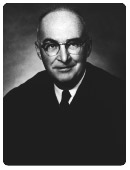Former justices

Justice George R. Currie
Wisconsin Supreme Court Justice: 1951–1968Chief Justice: 1964–1968
Life: 1900–1983
"With a Currie dissent, one knows what is meant and the precedent break that's occurring, Not so the intent of the cryptic shaft sent with the purring of Currie concurring." – Attorney Sam Bryan
George R. Currie was born on January 16, 1900, in Princeton, Wisconsin. He attended public school in Montello and graduated from Oshkosh State Teachers College in 1919.
During his senior year at the University of Wisconsin Law School, he was editor-in-chief of the Wisconsin Law Review. He graduated at the top of his class in 1925 and was inducted into the Order of the Coif.
For 26 years, Currie practiced law, specializing in corporate law, in Sheboygan. He was appointed to the Wisconsin Supreme Court in 1951. In 1964, he became the chief justice.
Currie was instrumental in creating the Wisconsin Judicial Conference, which annually brings together members of the state judiciary to "improve the order of justice in this state." He was part of the effort to introduce a Code of Judicial Ethics in 1967, which established governing rules for members of the state judiciary, both on and off the bench.
In 1967, Currie became the first chief justice to be unseated in an election. Although a colleague described him as "the prime intellect on the Court," several outside factors may have led to his defeat. The mandatory retirement age then in effect for judges would have only allowed Currie to serve only two years out of the 10-year term. The governor would have appointed his successor. In addition, a year earlier, the Supreme Court made an unpopular ruling that the state could not use its antitrust law to keep the Braves baseball team in Milwaukee. Although Currie did not write the opinion, he joined it.
After leaving the bench, Currie lectured at the University of Wisconsin Law School and was voted by the students as "Outstanding Teacher of Law." He also served as a reserve judge in Dane County.
In 1971, President Richard Nixon appointed Currie to head the investigative commission for the Office of Economic Opportunity. At the time, the Farm Workers Union was seeking funding from the California Rural Legal Assistance Program. Ronald Reagan, then governor of California, vetoed this funding and Currie's commission recommended presidential override of the governor's veto, prompting Reagan to characterize Currie as a "radical from a radical state."
A hardworking jurist, Currie relaxed by way of floriculture. He loved to grow dahlias. As a member of the Badger State Dahlia Society and president of the Dahlia Society of Wisconsin, he extended his expertise to dahlia judging. His flowers frequently brightened the tables in the Supreme Court.
Currie and his wife Gladys Bremer had two daughters, Janet and Ann. Currie died June 9, 1983, in Madison.
At Currie's memorial service, Chief Justice Nathan S. Heffernan said: "It is not an exaggeration to say that it was George Currie who brought the Wisconsin court system out of the dark ages."

